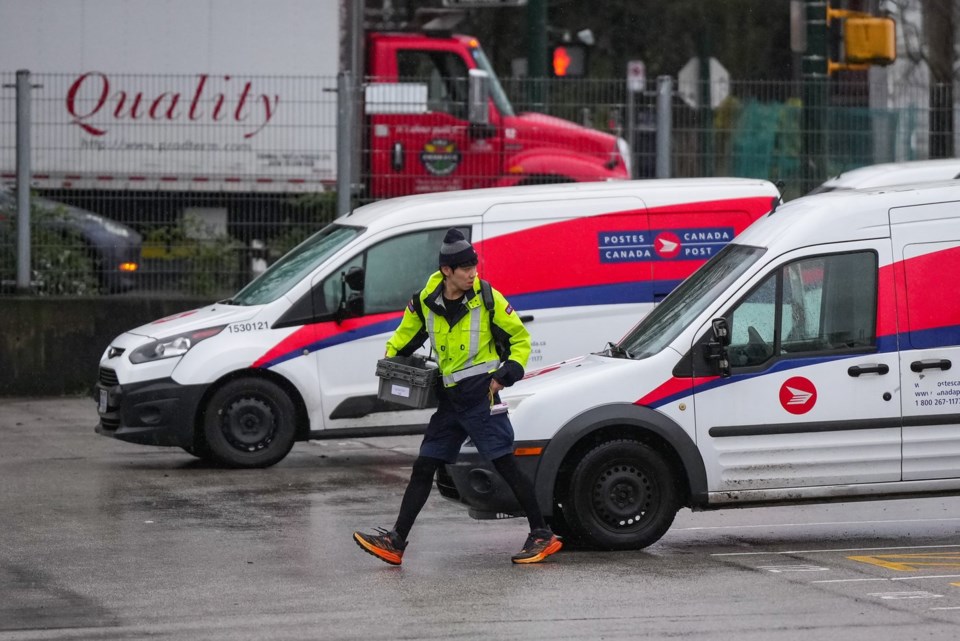OTTAWA — The federal government is asking unionized Canada Post employees to vote directly on the latest offers from the postal service — a rare intervention in labour negotiations that one expert said could give the employer the "upper hand" in its long-standing dispute with the union.
Federal Jobs Minister Patty Hajdu announced in a social media post Thursday that she's using her powers under the Canada Labour Code to send the Crown corporation's latest offers to Canadian Union of Postal Workers members for a vote.
The Canada Industrial Relations Board will be directed to conduct the vote "as soon as possible," she said.
In a media statement issued Thursday, Canada Post spokesperson Lisa Liu said the corporation welcomes the vote, adding "it will provide employees with the opportunity to have a voice and vote on a new collective agreement at a critical point in our history."
"A negotiated agreement between the parties has always been the preferred path to an employee ratification vote, however the parties remain at a major impasse," Liu said.
Hajdu said it's in the "public interest" to give the roughly 55,000 CUPW members an opportunity to vote on the offers, which Canada Post has said are its "final" proposals.
While Canada Post requested the vote as a way to resolve the 18-month-old dispute in a timely manner, the jobs minister directed the parties last week to hash out terms for binding arbitration — a process CUPW said it would support.
The union accused Canada Post of being "not serious about meaningful arbitration" in a bulletin sent to members Tuesday.
CUPW said Thursday that Hajdu's move is "yet another assault" on its collective bargaining rights.
"In December, former Minister of Labour, Steven MacKinnon used section 107 to put our legal strike on 'pause,' and section 108 to strike an Industrial Inquiry Commission (IIC)," it said in a bulletin.
"These repeated government attacks have poisoned the bargaining process."
The union said it's calling on members to reject Canada Post's offers.
Adam King, assistant professor in the labour studies program at the University of Manitoba, said governments rarely impose votes to settle labour disputes and usually do so only when bargaining has gone on for a very long time. A simple majority is usually needed to pass the vote, he said.
"The reason that it's rare is because it's quite controversial," King said. "Unions, of course, do not like it. They consider it to be a form of government interference."
Like other interventions, King said a forced vote sends a message to employers that they don't have to meet the union's demands at the bargaining table — they can instead count on the government to bail them out.
Though these forced votes are perfectly legal and set out in the labour laws of many jurisdictions, King said there's nothing "natural" about them in the negotiation process.
"It was something that was inserted into the labour relations framework to give government and employers a kind of upper hand on unions, actually." he said.
CUPW has been in a legal strike position since May 23 but workers have not taken to the picket lines. Instead, the union has opted for a national ban on overtime.
Canada Post and its union have been negotiating for roughly a year and a half on a new deal for workers while the postal service's financial plight has grown worse.
The latest offers tabled by Canada Post on May 28 include a wage hike of a little more than 13 per cent over four years and plans to introduce weekend mail service, along with other structural changes aimed at keeping the postal service afloat.
Those changes include the introduction of a corps of part-time postal workers with similar rates of pay and benefits.
King said Canada Post might suspect workers are "frustrated" and "exhausted" as the negotiations stretch on and are more willing now to approve the latest offers.
But Larry Savage, a professor of labour studies at Brock University, thinks this tactic could backfire on the employer.
"Canada Post’s decision to ask the minister to approve a forced vote will likely result in a backlash that helps unify a divided CUPW membership in opposition to the employer," he said in an email.
Savage said it's not clear how a failed vote would get the parties any closer to a resolution.
An Industrial Inquiry Commission set up by the federal government after last year's month-long holiday season strike by postal workers found that Canada Post was essentially bankrupt.
In the final report tabled in May, Commissioner William Kaplan recommended an end to daily door-to-door mail delivery and an expansion of community mailboxes, among other measures to keep the postal service in business.
He also endorsed Canada Post's model for part-time mail workers — one sticking point in negotiations — and largely blamed the stalled negotiations on CUPW defending "business as usual."
Savage said the Kaplan report "undermined" CUPW's bargaining position, and though the union went on strike late last year, it doesn't have the capacity for that kind of labour action this time around.
"This makes government intervention increasingly likely in the event of a contract rejection," he said.
— with files from Christopher Reynolds in Montreal
This report by The Canadian Press was first published June 12, 2025.
Craig Lord, The Canadian Press



